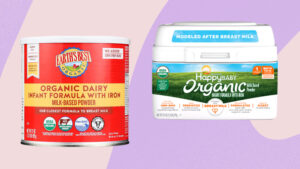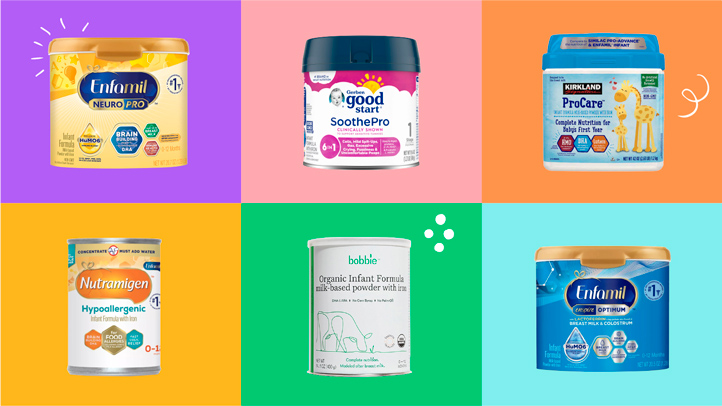
If you are looking for a formula that is made from organic ingredients and meets high standards of quality and safety, you might be wondering which one is the best for your baby. There are many options available, but not all of them are created equal. Here are some tips on how to choose the best organic baby formula for your little one.
What is organic baby formula?
Organic baby formula is made from milk products that are produced without using pesticides, herbicides, antibiotics or growth hormones. It also contains organic ingredients that are approved by the USDA National Organic Program and follow certain production standards. Organic baby formula is designed to mimic breast milk and provide the nutrients that your baby needs for growth and development.
Why choose organic baby formula?
Some parents prefer organic baby formula because they believe it has some benefits over conventional formula, such as:
- It is free of artificial colors, flavors, sweeteners and preservatives
- It may reduce the exposure to harmful chemicals and contaminants
- It may support the health of the environment and the animals
However, it is important to note that there is not enough evidence to prove that organic baby formula is better or more effective than conventional formula in terms of long-term health outcomes. The American Academy of Pediatrics (AAP) states that both types of formula are safe and nutritious for babies.
How to compare different types of organic baby formula?
There are different types of organic baby formula available, depending on the source of protein, the type of carbohydrate, the presence of prebiotics or probiotics, and other special features. Here are some common types of organic baby formula:
- Milk-based: This is the most common type of organic baby formula. It is made from cow’s milk that is altered to resemble breast milk. It contains lactose as the main carbohydrate and may also have added iron, DHA, ARA and other nutrients.
- Soy-based: This type of organic baby formula is made from soy proteins and does not contain any animal products. It is suitable for babies who have a milk allergy or intolerance, or who follow a vegan diet. However, it is not recommended for babies who have a soy allergy or who have congenital hypothyroidism.
- Hydrolyzed: This type of organic baby formula has milk proteins that are broken down into smaller pieces, making them easier to digest. It is suitable for babies who have a mild to moderate milk allergy or sensitivity, or who have colic or reflux. However, it is not recommended for babies who have a severe milk allergy or anaphylaxis.
- Specialized: This type of organic baby formula is designed for babies who have specific medical conditions or dietary needs, such as premature birth, low birth weight, metabolic disorders or malabsorption. It may have different amounts or types of protein, fat, carbohydrate, vitamins and minerals than regular formulas.
When comparing different types of organic baby formula, you should consider the following factors:
- The age and weight of your baby
- The nutritional needs and preferences of your baby
- The availability and cost of the formula
- The taste and texture of the formula
- The ease of preparation and storage of the formula
You should also consult your pediatrician before choosing or switching to a new type of organic baby formula.
What are some of the best organic baby formulas?
Based on our research and expert feedback, here are some of the best organic baby formulas that you can consider trying:
- Earth’s Best Organic Formula: This is one of the most popular and trusted brands of organic baby formula. It offers several options for different stages and needs, such as dairy, soy, sensitivity, gentle and toddler formulas. It is made with organic lactose from grass-fed cows and contains DHA, ARA, prebiotics, iron and other nutrients.
- Happy Baby Organic Infant Formula: This brand offers two options for stage 1 and stage 2 formulas. It is made with organic lactose from grass-fed cows and contains DHA, ARA, prebiotics, probiotics, iron and other nutrients. It also has a dual prebiotic blend that mimics breast milk oligosaccharides (HMOs), which are beneficial for immune health.
- Burt’s Bees Baby Organic Formula: This brand offers two options for dairy-based formulas: regular and ultra gentle. It is made with organic lactose from grass-fed cows and contains DHA, ARA, iron and other nutrients. The ultra gentle option has partially hydrolyzed proteins for easier digestion.
- Bobbie: This brand offers a European-style organic infant formula that is inspired by breast milk composition. It is made with organic lactose from grass-fed cows and contains DHA, ARA, prebiotics, probiotics, iron and other nutrients. It also has a high amount of whey protein and a low amount of palm oil, which may be better for digestion and absorption.
- Parent’s Choice Organic Formula: This brand offers an affordable and widely available option for organic baby formula. It is made with organic lactose from grass-fed cows and contains DHA, ARA, iron and other nutrients. It is also GMO-free and gluten-free.
- Baby’s Only Organic Formula: This brand offers several options for organic toddler formulas, such as dairy, soy, lactorelief, whey protein and plant-based. It is made with organic ingredients and contains DHA, ARA, iron and other nutrients. It is also GMO-free and gluten-free.
How to choose the best organic baby formula for your baby?
The best organic baby formula for your baby depends on several factors, such as your baby’s age, weight, health, preferences and tolerance. There is no one-size-fits-all formula that works for every baby. You may have to try different brands and types of organic baby formula until you find the one that suits your baby best.
Here are some tips on how to choose the best organic baby formula for your baby:
- Start with a milk-based organic formula, unless your baby has a milk allergy or intolerance, or you have a strong preference for a different type of formula.
- Choose a stage-appropriate organic formula that matches your baby’s age and weight. Most formulas are labeled as stage 1 (0 to 6 months), stage 2 (6 to 12 months) or stage 3 (12 months and up).
- Look for an organic formula that has the USDA organic seal and meets the FDA standards for infant formula. You can also check the ingredients list and the nutrition facts label to see what the formula contains and how much.
- Compare different brands and types of organic formula based on their features, benefits, drawbacks, availability, cost and reviews. You can also ask your pediatrician or other parents for recommendations.
- Introduce a new type of organic formula gradually and monitor your baby’s reaction. You can start by mixing a small amount of the new formula with the old one and increase the ratio over time. You can also offer the new formula at a different time of the day than the old one. Watch out for any signs of allergy, intolerance or discomfort, such as rash, hives, swelling, vomiting, diarrhea, gas, bloating or fussiness.
- If your baby does not like or tolerate a certain type of organic formula, do not force it or give up. You can try another brand or type of organic formula that may suit your baby better. You can also talk to your pediatrician about other options or solutions.
FAQs
Here are some frequently asked questions about organic baby formula:
- Is organic baby formula better than breast milk? No. Breast milk is the best source of nutrition for most babies. It contains antibodies, hormones, enzymes and other substances that are not found in any formula. It also adapts to your baby’s changing needs and protects your baby from infections and diseases. The AAP recommends exclusive breastfeeding for the first 6 months of life, followed by continued breastfeeding along with complementary foods until at least 12 months of age.
- Is organic baby formula better than non-organic formula? Not necessarily. Both types of formula are safe and nutritious for babies. The main difference is that organic baby formula is made from organic ingredients that are produced without using certain synthetic materials or methods. However, there is not enough evidence to show that organic baby formula has any significant health advantages over non-organic formula in the long run.
- How much organic baby formula does my baby need? The amount of organic baby formula that your baby needs depends on several factors, such as your baby’s age, weight, growth rate, appetite and activity level. As a general guide, you can use this table to estimate how much organic baby formula your baby may need per day:
| Age | Weight | Formula per feeding | Feedings per day | Total formula per day |
| 0 to 1 month | 5 to 8 lbs | 2 to 3 oz | 8 to 12 | 16 to 36 oz |
| 1 to 3 months | 8 to 13 lbs | 3 to 4 oz | 6 to 10 | 18 to 40 oz |
| 3 to 6 months | 13 to 17 lbs | 4 to 5 oz | 5 to 8 | 20 to 40 oz |
| 6 to 9 months | 17 to 21 lbs | 5 to 6 oz | 4 to 7 | 20 to 42 oz |
| 9 to 12 months | 21 to 25 lbs | 6 to 8 oz | 3 to 5 | 18 to 40 oz |
Note: These are only approximate values. Your baby may Possible response:
Your baby may need more or less formula than the average amount. You should follow your baby’s hunger and fullness cues and adjust the amount of formula accordingly. You should also consult your pediatrician for specific guidance on how much organic baby formula your baby needs.
- How do I prepare organic baby formula? You should follow the instructions on the label of the organic baby formula that you choose. Generally, you will need to measure the right amount of water and powder or liquid concentrate and mix them well in a clean bottle. You can use tap water, filtered water or bottled water, as long as it is safe and fluoride-free. You can also boil the water and let it cool before mixing it with the formula. You should not use a microwave to heat the formula, as it can create hot spots that can burn your baby’s mouth. You should also not add any extra ingredients, such as sugar, honey, cereal or juice, to the formula, as they can cause health problems for your baby.
- How do I store organic baby formula? You should store unopened containers of organic baby formula in a cool, dry place away from direct sunlight and heat. You should check the expiration date and use the formula before it expires. You should also not use any formula that looks or smells unusual or has signs of damage or tampering. Once you open a container of organic baby formula, you should follow the storage instructions on the label. Generally, you will need to refrigerate the opened container and use it within a certain period of time. You should also discard any unused or leftover formula after each feeding, as bacteria can grow quickly in it.
Conclusion
Choosing the best organic baby formula for your baby can be a challenging task, but it can also be a rewarding one. By doing some research, comparing different options and consulting your pediatrician, you can find the organic baby formula that meets your baby’s needs and preferences. Organic baby formula may offer some benefits over conventional formula, such as being free of artificial additives and harmful chemicals, but it is not necessarily better or more effective than conventional formula in terms of long-term health outcomes. The most important thing is to feed your baby a safe and nutritious formula that supports their growth and development.




